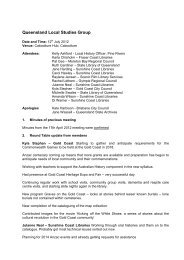The Anatomist by J A Rodgers
The Anatomist by J A Rodgers
The Anatomist by J A Rodgers
You also want an ePaper? Increase the reach of your titles
YUMPU automatically turns print PDFs into web optimized ePapers that Google loves.
Young Writers Award 2011, highly commended entry<br />
<strong>The</strong> <strong>Anatomist</strong><br />
<strong>by</strong> Jacqueline Allen <strong>Rodgers</strong><br />
‘<strong>The</strong> scan shows you have some early indications of Alzheimer’s,’ said the specialist<br />
in a low and measured tone, picking his words cautiously and smiling weakly. After<br />
this declaration, he paused dramatically, allowing me some time to digest the<br />
prognosis, before continuing in a steady monotone. ‘Naturally, you should begin<br />
preparations for your future. Firstly, I would recommend preparing legal documents<br />
such as an advanced health directive and your will, nominating a power of attorney,<br />
and so forth, and make arrangements for your care. Please forgive me for getting<br />
ahead of myself,’ the specialist apologised, ‘you’re of course familiar with the<br />
symptoms of Alzheimer’s?’<br />
I nodded stiffly; I was well acquainted with the condition. I’d personally opened up the<br />
skulls of innumerable individuals who had suffered the disease. Year after year, as a<br />
matter of invariable pedagogical habit, I’d show my first semester first year students<br />
two brain sections, one of a woman who died in her 70s with Alzheimer’s, another of<br />
a neurotypical individual who died at the same age. <strong>The</strong> difference was glaringly<br />
obvious: the Alzheimer’s brain is scrawny and pitted with cavernous a<strong>by</strong>ss-like sulci;<br />
where the normal brain was plump; the Alzheimer’s brain has gaping voids.<br />
Invariably, in week two of semester one, I would hold up the two brain sections<br />
encased in resin, and I would deliver a thunderous catechism to my first years,<br />
booming, ‘Who among you believes in a soul?’<br />
After having posed this question, year after year, I confess to having enjoyed the<br />
discomfort of my students as the faces of the conspicuously Muslim members of the<br />
class would darken with anxiety; I’d then survey the room for otherwise discreet<br />
crucifixes, and watch students of Indian heritage in particular for tell-tale signs of<br />
nervousness. Although it did happen on several memorable occasions in my<br />
teaching career, it was rare indeed that a student would raise his or her hand to<br />
confess to ideological transgression. More often than not, however, a dense silence<br />
would fall on the room, while suspect individuals shyly reorganised their notes,<br />
fiddled with their pens, or turned their gaze towards a near<strong>by</strong> window.<br />
After I’d decided everyone was sufficiently uncomfortable, year after year, I’d launch<br />
into the same familiar diatribe with all the unshakable confidence of a man of<br />
Western science. ‘This area,’ I’d declare, pointing to an enlarged furrow indicating a<br />
place of absence in the resin-encased brain section, ‘is associated with language.<br />
Loss of vocabulary and incorrect word substitutions are one part of the earlier<br />
symptoms of Alzheimer’s, which may eventually degenerate into a complete loss of<br />
speech. Doubtless some of you know individuals with dementia. <strong>The</strong>y may<br />
experience changes in personality, becoming apathetic or aggressive. <strong>The</strong>y<br />
experience memory loss and cognitive impairment, to they extent they eventually<br />
won’t recognise even their family members. So, ladies and gentlemen, I hope it’s<br />
Young Writers Award 2011 highly commended entry: 1<br />
<strong>The</strong> <strong>Anatomist</strong> <strong>by</strong> Jacqueline Allen <strong>Rodgers</strong>
eadily apparent to you that you, you as a person, with your hopes and dreams, likes<br />
and dislikes, aren’t as much a creation of some ethereal soul as the physiological<br />
realities of the brain, and if you can’t handle that, maybe you’d be better off in an arts<br />
degree.’<br />
Now, as an individual with Alzheimer’s myself, the image of that shrunken brain came<br />
back to me very clearly, because this was my inexorable fate, and already, within the<br />
confines of my own skull, behind the layers of membrane, existed the infant disease;<br />
I already held within me the beginning of the plaques which would eventually claim<br />
my life. I rubbed my forehead: I had just been given an expiry date. I suddenly felt a<br />
sense of vast distance between myself and the rest of humanity. What I experienced<br />
then was an acute awareness of the unbridgeable gap between the living and the<br />
condemned. For weeks after my diagnosis, I’d hold the knowledge that I had the<br />
disease inside of me like a guilty secret. I felt newly displaced within an alien and<br />
hostile body, which I became convinced existed not for my benefit or interaction with<br />
the external world, but as a kind of unbreakable fetter, from which their was neither<br />
escape nor reprieve. I looked at my image in reflective surfaces with suspicion.<br />
Months passed and I stubbornly took none of the specialist’s recommendations.<br />
When my contract ended, I resigned from my position at the university. At a loss for<br />
what to do in my retirement, I initially took to frequenting libraries, places which I had<br />
previously enjoyed. I was surprised to find that I no longer felt happy in these places.<br />
I’d tried to read non-fiction, hoping to acquire some learning, while at the same time<br />
knowing that the progression of the disease would rob me of even the simple details<br />
of my identity. ‘Why burden myself with the endless trivia of living people,’ I thought,<br />
‘when, there is no knowledge capable of halting my own deterioration?’ After<br />
becoming disgusted with knowledge, I browsed dictionaries with the intention of<br />
building my already bloated vocabulary, but my eyes came to rest ominously only on<br />
words with foreboding connotations of decay: decline, decomposition, disintegration,<br />
dissolution. I let the weighty tome fall open at random in the hope of a chance<br />
encounter with a more auspicious leaf, but what met my eyes brought me further<br />
grief as I read the entries under ‘anatman’ and ‘annihilation’.<br />
Frustrated, I shut the wretched lexicon with a satisfying ‘thud’. I was incredibly bored.<br />
With absolutely nothing whatsoever to do, and not feeling any particular inclination to<br />
delay my fate <strong>by</strong> any kind of cognitive ploy, I was beset with boredom.<br />
Suffering unbearable ennui, I took to thinking. Memories came like running water,<br />
thick and fast. Dreams and dream fragments whorled and eddied, coming together to<br />
form flickering hallucinations, which dissipated in the vortex. <strong>The</strong> images came<br />
unbidden, across time and space I heard voices. Were they memories, or were they<br />
dreams? <strong>The</strong> years had blurred the distinction; it was unimportant. I remembered<br />
women; an awful lot of women. I remembered them all in minute detail, but as hard<br />
as I tried, I couldn’t remember their faces. I stood in the midst of an endless sea of<br />
faceless women which extended to the horizon; over bobbing heads I caught a<br />
glimpse of someone who looked familiar. I called out to her; she turned around and<br />
looked at me over the ocean of bodies. She raised her thin eyebrows and smiled,<br />
showing small, neat teeth. Her forehead was high; her cheekbones were prominent.<br />
Her thick and straight brown hair fell around her face in wave-like cascades; I caught<br />
a glimpse of her large grey-blue eyes before she was swept away <strong>by</strong> the crowd.<br />
Who had this woman been? I tried in vain to remember her name, but I couldn’t come<br />
up with it. She’d been a colleague, a fellow PhD student who worked in the cadaver<br />
labs at the university when I first began teaching. She had lived and breathed the<br />
Young Writers Award 2011 highly commended entry: 2<br />
<strong>The</strong> <strong>Anatomist</strong> <strong>by</strong> Jacqueline Allen <strong>Rodgers</strong>
ody; she was a bona fide obsessive. Upon returning home in the evening, she told<br />
me, she would recite the names of all of the muscles of the body, then the bones,<br />
before proceeding to copy thousands of images from dense anatomical compilations,<br />
all of which she dated, filed and labelled with impressive methodicalness.<br />
On account of her unsurpassed peculiarity, this woman was the continual fascination<br />
of staff and students alike. For amusement, students would sometimes ask her to<br />
recite complex physiological processes, a request with which she would happily<br />
comply, with superhuman detail and accuracy. Her prodigious memory gave her an<br />
aura of the supernatural, her strange beauty added to the impression she was not<br />
quite human. She was painfully shy and had few close friends. I was one of them. It<br />
was me alone with whom she confided the joys of anatomy, which she told me in<br />
confidence, made her more deliriously euphoric than wine.<br />
With her slate eyes ablaze with passion, she had told me without being asked one<br />
evening: ‘<strong>The</strong> human body is a place of teetering inebriation and intoxicating<br />
madness; it trembles and shivers, hanging pendulate as if suspended <strong>by</strong> a thread-<br />
oscillating between rapture and inconsolable grief. Its crude form is drunkennes, but<br />
its minutiae are bliss.’ This she had declared to me with a scalpel in her hand, as she<br />
carefully removed the reproductive system of a cadavar for preparation in epoxy as a<br />
collection specimen for teaching. I didn’t think twice about this statement, it barely<br />
touched on the eccentricity of some of her other impassioned declarations.<br />
‘Is that why you became an anatomist?’ I asked her. ‘No.’ she replied, the scalpel still<br />
moving deftly in her hand. ‘I became an anatomist because it’s holy work. It’s like<br />
prayer to me. This (at this point, she waved a small hunk of detached visceral matter<br />
at me) is conditioned reality. This is existence and everything that has ever existed.<br />
<strong>The</strong>re’s nothing outside of this.’<br />
She continued. ‘When I was twelve, I dreamt I was dead. I was lying on stainless<br />
steel table, where oily drops of moisture had condensed on the cold surface.<br />
Shadowy figures came: they cut and peeled with knives made of sharp wind; my skin<br />
melted away and disappeared like it was being eaten <strong>by</strong> invisible acid. I saw my body<br />
laid open: there was a flash of blue fire, and my fat bubbled and boiled off me, my<br />
muscle was torn to shreds <strong>by</strong> absent diabolical fingers, then my bones, which had<br />
become a powder in the intense heat, blew away, so only my brain, heart, viscera,<br />
veins and arteries, remained, connected <strong>by</strong> bundles of nerves. I watched my heart<br />
pump, my lungs inflate and deflate on the table. <strong>The</strong> figures departed noiselessly.<br />
Days and nights passed; then ants came and took what remained of my body,<br />
leaving only the movement of my breath, which the ants could not carry. I didn’t see<br />
or hear my breath, the ants had taken away form and feeling, so I knew it only with<br />
my heart. I lived like this for millenia, abiding with the movement of my breath.<br />
Eventually, the heat of that universe dissapated, and it collapsed inwardly, the<br />
pressure condensing that breath into a single brilliant white pearl of decreasing<br />
radius. <strong>The</strong> pearl was beautiful in unimaginable ways, long aeons I stayed admiring<br />
it, the pearl which was at once both light and liquid. It called me inwardly, I drowned<br />
in light, I became light, and the dream ended at this point. Anyway, that’s why I<br />
became an anatomist,’ she said, before triumphantly extracting the two grey-pink<br />
ovaries, the uterus, and vagina in their natural configuration.<br />
‘It’s getting late,’ I said. I found her sporadic outbursts more entertaining than<br />
interesting; my interest in the human body was rational rather than psychic, at that<br />
Young Writers Award 2011 highly commended entry: 3<br />
<strong>The</strong> <strong>Anatomist</strong> <strong>by</strong> Jacqueline Allen <strong>Rodgers</strong>
time there was no hint of surreal physical dissociation in either my sleeping or waking<br />
life.<br />
‘Some students said they were going out drinking, but they said they wouldn’t go<br />
unless you came,’ I said, knowing she would only raise a few token objections before<br />
capitulating. Nightfall was fast encroaching, and I wanted desperately to get away<br />
from the labs.<br />
‘Didn’t they see the cadavar with the cirrhotic liver and the caput medusa today?’ she<br />
retorted sharply. ‘Since when has drinking with students ever been a good idea?’<br />
‘It’s a terrible idea, that’s why you need to come to supervise,’ I joked. She sighed. I<br />
knew I had won. She finished pouring the clear resin over the organs into a square<br />
mold, packed up, and we removed our gloves and lab coats and washed and<br />
disinfected our hands with ritual thoroughness.<br />
So, for better or worse, we did end up going out drinking. By no coincidence, there<br />
was a pub close to the medical school. As we walked down the street at dusk, the<br />
buildings were bathed in the strange orange glow of evening light; and she had that<br />
thick and unwordly light caught in her hair and eyes. It suddenly occurred to me that<br />
she was really very beautiful, and that I was in love with her and her stupid world,<br />
where ants gnaw at the corners of reality. We reached the pub, where we drank, but<br />
not much. We stayed long after the students left.<br />
In the early hours of the morning, we walked to the near<strong>by</strong> beach, our path<br />
illuminated <strong>by</strong> the light of skyscrapers. She smiled, she talked quietly and quickly,<br />
she poured out her visions of the body surreal; I listened. <strong>The</strong> dishplate moon hung<br />
bright and full. Together we gazed at the far horizon, where the moonlight played on<br />
the surface of the deep ocean; together we tasted the salt of the dense sea air. I was<br />
surprised to realise my arm was around her shoulder: when did I put it there? Her<br />
frame was surprisingly slight, her bones were thin, like those of sky-faring birds. She<br />
was pleasantly warm, I felt the movement of her breath as we sat on the sand. I<br />
reached out to touch her cheek, but her slender hand intercepted my own.<br />
Undiscouraged, I took that hand, with its long fingers and fine skin like translucent<br />
rice-paper, and I gently traced the flow of blood back to her heart, through the dorsal,<br />
basilic, and axillary veins; through the subclavian vein under her collarbone. She<br />
shook her head gently and sighed.<br />
‘I don’t feel anything for you,’ she said, ‘we spent all day in the cadaver lab, how<br />
could I? I know intimately the decrepitude, brokenness, greying and wrinkling of the<br />
body; besides, I still reek of formaldehyde.’<br />
I remembered then the mole on her neck, like a splash of dark ink on her light skin; I<br />
remembered the delicate depression above her clavicle; I remembered the<br />
embroidered flowers on her dress, the arch of her eyebrows, the smoothness of her<br />
forehead. I wanted then nothing more desperately than to be something other than a<br />
living corpse, but I couldn’t bring myself to be convinced otherwise. That night, even<br />
though I was a rational man of Western science, possessing infallible confidence in<br />
materialist philosophy, I wept like a child in spite of myself.<br />
Having recalled all this, and having left the field of memories, I exited the library and<br />
returned home. I brought out the phonebook and searched for the number of a<br />
solicitor, I placed an advertisement for a carer. I arranged to have my body donated<br />
to the anatomy school. I fixed my will upon learning how to forget; I let go of the<br />
Young Writers Award 2011 highly commended entry: 4<br />
<strong>The</strong> <strong>Anatomist</strong> <strong>by</strong> Jacqueline Allen <strong>Rodgers</strong>
haunting memories of the cadaver lab and the woman who worked there. I then took<br />
a biro and penned a small note while thinking of my future, which read simply:<br />
‘A stranger is going to come to live in my body. Please forgive him of everything.’<br />
…and I left it with care on the table. Soon, I will be going out, and I will not be taking<br />
my body with me.<br />
Young Writers Award 2011 highly commended entry: 5<br />
<strong>The</strong> <strong>Anatomist</strong> <strong>by</strong> Jacqueline Allen <strong>Rodgers</strong>


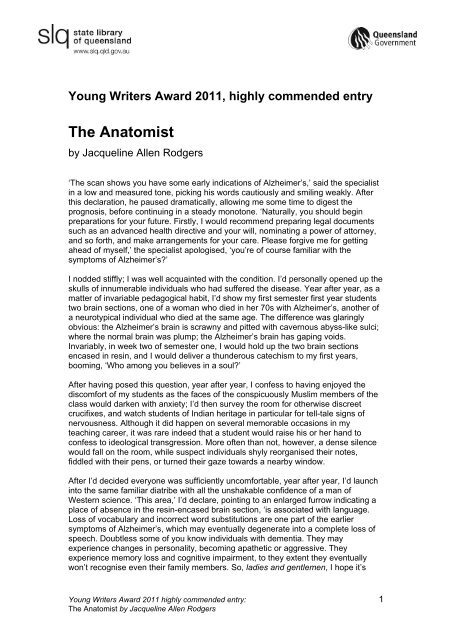
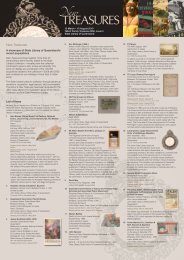
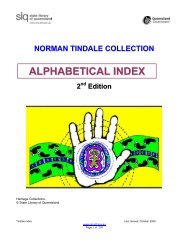
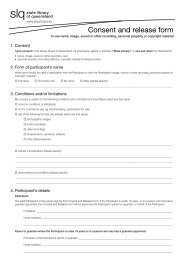
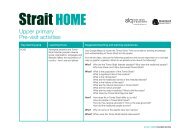
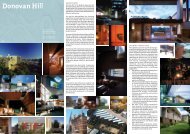
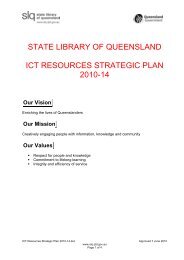
![2009-10 [ 13 MB] - State Library of Queensland - Queensland ...](https://img.yumpu.com/26312803/1/184x260/2009-10-13-mb-state-library-of-queensland-queensland-.jpg?quality=85)
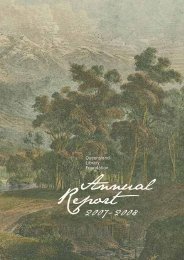
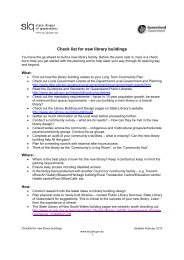
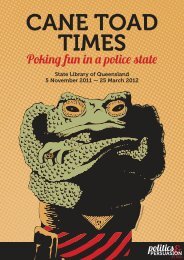
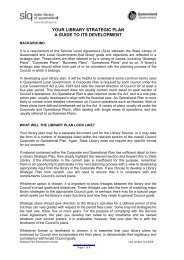
![2011-12 Part 4 [PDF 3.0 MB] - State Library of Queensland](https://img.yumpu.com/26312768/1/190x135/2011-12-part-4-pdf-30-mb-state-library-of-queensland.jpg?quality=85)
![Full room brochure [ (PDF 1.3 MB)] - State Library of Queensland](https://img.yumpu.com/26312762/1/190x101/full-room-brochure-pdf-13-mb-state-library-of-queensland.jpg?quality=85)
